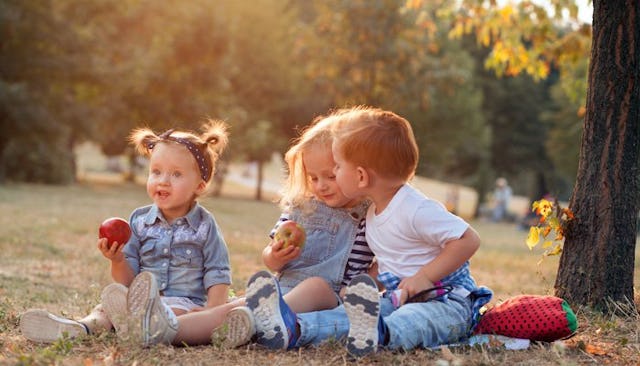It’s Creepy When Parents Say Their Babies Are 'Flirts'

I was on the playground with my toddler son when he leaned over a baby carriage containing a 1-year-old girl. The baby reached out and grabbed his hand, and the other mother said, “Oh, she’s such a flirt!” and laughed.
If you’re reading this, you’re probably already pissed that I’m making something out of such an innocuous comment. But nonetheless, I’m making something out of it: It’s creepy when people say stuff like that. It’s creepy when they say that their babies are flirty or that children are boyfriend and girlfriend.
It’s creepy when someone says “she’s so coy” when a girl baby engages with you and then looks away with indifference. Because if a girl baby engages with you and then looks away, indifferently, it’s because she’s indifferent. Because she’s a baby and she’s lost interest, like babies do. Coy implies that the baby has some intent, some ulterior motive to make you, the helpless victim of her charms, to do something you wouldn’t have otherwise done, because she’s a wily female.
We already know that our culture starts enforcing gender stereotypes very early—on babies and toddlers—and that they respond to those cues. The “she’s such a flirt” or “she’s so coy” comments are an earlier, milder version of the comment “she knows what she’s doing” when people accuse tween and teen girls of being sexually provocative.
Yes, it sounds like a small, trivial thing. But a culture is made up of a million trivial things. When the St. Paul’s rape case was on the front page, a relative of mine said, “I’m glad you didn’t get yourself into a situation like that in high school.” This is another trivial comment, I know! She was merely expressing that she was glad I wasn’t raped in high school. But she was placing my experience of not being raped, and the St. Paul’s girl’s experience of (at least statutory) rape, squarely on our—we girls’—shoulders.
The boys? Not a concern. My relative didn’t mean anything by her comment, either, and the comment was indeed a small thing. But it was revealing of the larger cultural attitude toward women, girls and sex: We place girls and women in the roles of gatekeepers. They are responsible for whether or not sex happens, and if it happens against their will, they’re responsible for that too. Women and girls are manipulators, showing their 5-year-old shoulders and flirting with the other babies on the playground. They know what they’re doing.
And while we’re on the subject, it’s also creepy when people say that babies and little kids are “boyfriend and girlfriend.” It’s bad enough when they’re too young to understand, but it’s downright crummy when the children are 3 or 4, or older, and some well-meaning but clueless relative says, “Oh, Sophie is Jacob’s little girlfriend. She’s got him wrapped around her little finger.” I remember adults doing this to me as a child. It placed another layer on an innocent friendship that somehow sullied it.
I admit, I used to think things like this about my son’s little female friends: They’re so cute. Wouldn’t it be adorable if they grew up and got married. But for right now, they’re buddies. No one is flirting with anyone. They’re babies. They don’t know what they’re doing.
This article was originally published on